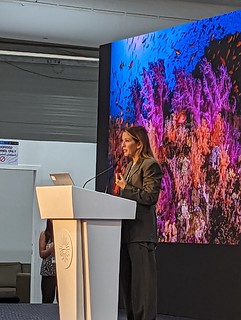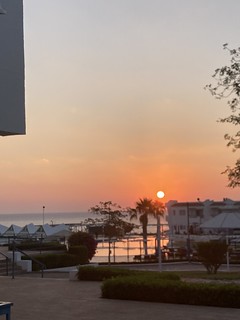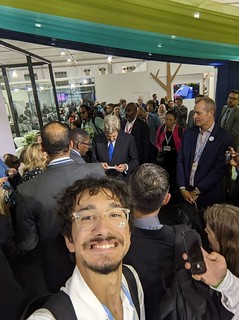Coming into COP27 with a cohort of like-minded, passionate students and faculty and high expectations for our world’s climate leaders, I was met with a firsthand view of global negotiations and action. The reality of global negotiations is far more complex, difficult, and time-consuming than we think. This year, negotiators arrived at a landmark “Loss and Damages” agreement that established a fund for allocation to vulnerable countries and their communities that are disproportionately impacted by the climate crisis. Their arrival at this consensus marks the culmination of decades-old pressure applied by countries that need the greatest assistance in adapting and combating the detrimental effects of climate change.
Every year at COP, hundreds of nonprofit organizations, government officials, companies and other stakeholders within the environmental sphere congregate to exchange ideas and foster a space for multifaceted conversations. The space of environmental activism can be overwhelming, and I often find myself wondering where my role as an undergraduate student lies amongst other young environmentalists. Attending COP27 allowed me to connect my previous life and professional experiences to new knowledge that I absorbed with every panel discussion, every interaction with a fellow environmentalist, and every pavilion visit around the Blue Zone. As an incubator for diverse thought, this conference challenged me to examine climate issues through different lenses and encouraged me to continue learning through the experiences of others. I realized that the most impactful takeaways I had gathered stemmed from the bridging of various experiences and perspectives.
One topic that I found particularly fascinating was ecocide and its implications for the field of environmental law and activism. I had the opportunity to attend a panel event hosted by the nonprofit organization “Stop Ecocide International,” seeking to elevate ecocide to international recognition as a crime. Defined in simple terms as “the mass damage and destruction of the natural living world,” ecocide has become a burgeoning problem that necessitates a global response to mitigate further destruction. Attending this event allowed me to delve deeper and gain new insights on a topic that my previous research work had focused on from the surface level.
My experience at COP reinforced my desire to pursue a career in law and expanded the scope of environmental legal issues that I was familiar with prior to attending the conference. While immersing myself in the discussions surrounding environmental law and policy, I experienced a rollercoaster of emotions. There were many moments where I felt hopeful for the tangible, positive impact that legal climate action holds for our planet’s future, while simultaneously feeling overwhelmed by the obligation to understand these broad legal frameworks and processes of climate litigation and justice in one sitting. Above all else, I have been able to broaden my previously rudimentary understanding of climate litigation through this experience to guide my interests in a potential legal career.
 My time in Sharm El-Sheikh was a display of the progress made in the fight for climate justice, but a sobering reality of how much further we have to go. I came to the conference with a desire to see ardent talks making monumental progress, but I was faced with stolid negotiations focused on the minutiae rather than tangible, large-scale solutions. Everytime I sought progress, I was met with compromise. Perhaps the zenith of COP27 was the announcement of a “Loss and Damage” fund intended to assist those countries most affected by climate change. Yet, there is no clear indication of who will pay into the fund, where the money will come from, or who will benefit.
My time in Sharm El-Sheikh was a display of the progress made in the fight for climate justice, but a sobering reality of how much further we have to go. I came to the conference with a desire to see ardent talks making monumental progress, but I was faced with stolid negotiations focused on the minutiae rather than tangible, large-scale solutions. Everytime I sought progress, I was met with compromise. Perhaps the zenith of COP27 was the announcement of a “Loss and Damage” fund intended to assist those countries most affected by climate change. Yet, there is no clear indication of who will pay into the fund, where the money will come from, or who will benefit.
 Sharm-el-Sheikh, the location of COP27, is a coastal Egyptian resort town that is adjacent to the Great Fringing Reef. Located in the cooler waters of the Red Sea, this reef is one of the most resilient reefs in the world; it is no surprise that COP27 publicity and advertisements repeatedly featured images and videos of the beautiful and vibrant underwater world. On one panel, “Hope For Coral Reefs,” singer-songwriter Ellie Goulding praised the reef’s “sheer visual beauty” and encouraged the audience to “please experience this reef yourself.” Yet at a conference where activisists and negotiators are working long days– and sometimes overnight– there seemed to be little time left to enjoy the beauty of nature.
Sharm-el-Sheikh, the location of COP27, is a coastal Egyptian resort town that is adjacent to the Great Fringing Reef. Located in the cooler waters of the Red Sea, this reef is one of the most resilient reefs in the world; it is no surprise that COP27 publicity and advertisements repeatedly featured images and videos of the beautiful and vibrant underwater world. On one panel, “Hope For Coral Reefs,” singer-songwriter Ellie Goulding praised the reef’s “sheer visual beauty” and encouraged the audience to “please experience this reef yourself.” Yet at a conference where activisists and negotiators are working long days– and sometimes overnight– there seemed to be little time left to enjoy the beauty of nature. At the same time, it is important to recognize the privilege and responsibility that comes with being able to attend COP27. Very few people have the opportunity to travel to the conference, and it is especially rare to be able to do so as a student. To have spent a week in a hotel along the coast of the Red Sea was amazing, with that luxury in juxtaposition with many of the stories told by activists from communities where significant impacts from climate change are already being felt. However, I also believe that the coming together of activists, politicians, negotiators, citizens, and indigenous peoples from around the world in one place is invaluable, and that finding joy in the world around us is necessary to sustaining activism. Particularly as frustratingly little progress was made on reaching a 1.5 degree warming target, it is important to take time to reset for the continued fight for a more equitable and sustainable future.
At the same time, it is important to recognize the privilege and responsibility that comes with being able to attend COP27. Very few people have the opportunity to travel to the conference, and it is especially rare to be able to do so as a student. To have spent a week in a hotel along the coast of the Red Sea was amazing, with that luxury in juxtaposition with many of the stories told by activists from communities where significant impacts from climate change are already being felt. However, I also believe that the coming together of activists, politicians, negotiators, citizens, and indigenous peoples from around the world in one place is invaluable, and that finding joy in the world around us is necessary to sustaining activism. Particularly as frustratingly little progress was made on reaching a 1.5 degree warming target, it is important to take time to reset for the continued fight for a more equitable and sustainable future. Winning a monumental court case should feel incredible, right? The opposite was true for Luisa Neubauer, the plaintiff in
Winning a monumental court case should feel incredible, right? The opposite was true for Luisa Neubauer, the plaintiff in 


